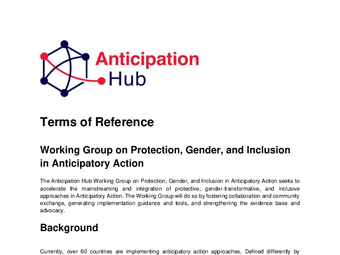Categories
Working Group on Protection, Gender, and Inclusion in Anticipatory Action
Currently, over 60 countries are implementing anticipatory action approaches. Defined differently by different actors, anticipatory action operates under disparate criteria, timelines, and decision-making processes. Yet, it usually works by using available data and evidence to trigger the release of financial resources for interventions that have been collectively and collaboratively identified and agreed in advance by humanitarian, development, and scientific partners.
There is growing interest in moving from small-scale pilots to anticipatory action at scale. Scaling up means dedicating more funding and resources so that more people can receive assistance and protection ahead of predictable shocks, expanding the geographic coverage and types of shocks and stresses that can be anticipated, as well as the ability and capacity of the system to respond collectively in a coordinated manner. Therefore, scaling up is not about doing just more, it also means doing better.
Namely, effective early warnings and anticipatory action systems can support and strengthen the ability of groups facing potential disasters and crisis to mitigate the impacts, better cope with shocks and stresses, and address any issues of discrimination. Comprehensive analyses of vulnerabilities, risk factors, and coping strategies can be used to inform protective, gender transformative, and inclusive outcomes.
- Anticipatory action is a set of actions taken to prevent or mitigate potential disaster and crises’ impacts before a shock or before acute impacts are felt.
- Protection means preventing, mitigating and responding to violence, notably Gender Based Violence (GBV), to keep people safe from harm.
- Gender and diversity is about addressing discrimination and understanding people's different needs, risks, and capacities.
- Inclusion means actively addressing exclusion by meaningfully involving and engaging excluded, disabled, and hard to reach people in our work.
Anticipatory actions should be tailored and prioritised to ensure that we reach all people effectively and in a non-discriminatory and equitable manner. Our work must ensure dignity, access, participation, and safety for all people affected by disasters and crises.
Although there is increasing recognition of the importance of integrating protective, gender-transformative, and inclusive approaches in Anticipatory Action, these are not yet consistently applied and typically lack the capacity, resources and monitoring mechanisms to ensure successful prioritisation and implementation. There is a growing need to further embed those dimensions in Anticipatory Action approaches and build an evidence and advocacy base.
Working Group
AIMS AND OBJECTIVES
The working group aims to facilitate greater technical exchange as well as engage, advocate and disseminate resources, good practices, lessons learned, and solutions on the mainstreaming and integration of protection, gender and inclusion in anticipatory action. It also aims to improve coordination between all the actors involved and the instruments set up by government, communities, humanitarian and development actors, at the global, regional, national and local levels. Partners would act in a harmonized way, not necessarily all for the same events or at the same time, but reflecting their specific mandates, relative strengths and capacity.
Overall, the working group seeks to accelerate the mainstreaming and integration of protection, gender and inclusion in anticipatory action, by pursuing the following objectives:
- Foster collaboration and community exchange;
- Generate implementation guidance and tools;
- Strengthen the evidence base and advocacy.
CO-CHAIRS
The working group is hosted by the Anticipation Hub and co-chaired by the IFRC and Plan International. Please get in touch with the co-chairs below for more information on joining the working group.
MEMBERSHIP
The membership includes organizations who are working on mainstreaming and integrating protection, gender and inclusion in anticipatory action, or have strong ambitions to do so.
Read more in the working group's terms of reference here.
PUBLICATIONS
'Integrating child protection, education and gender-based violence into anticipatory action', briefing (October 2023)
Watch a presentation by Wenddy Emilia Vera García, leader of the 'Because I am a Girl' movement in South America, which she made at the 11th Global Dialogue Platform for Anticipatory Humanitarian Action in October 2023. The video was edited by Plan International.
Play Video

Contact
Please get in contact with the co-chairs below if you would like to join the Working Group.
Kirstin Lange
Programme Specialist (Disability Inclusive Humanitarian Action)UNICEF
Raise your Question

